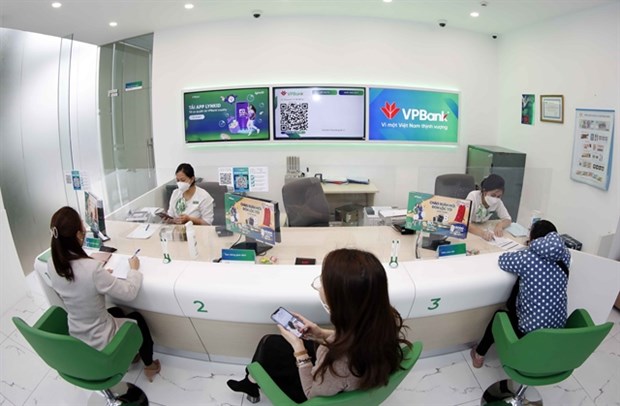Appropriate foreign ownership limit at banks expected to attract investment
Foreign ownership limits at credit institutions were expected to be raised to an appropriate level to attract foreign investment, which plays an important role in improving operational efficiency and accelerating the banking sector's restructuring.
Foreign ownership limit s at credit institutions were expected to be raised to an appropriate level to attract foreign investment, which plays an important role in improving operational efficiency and accelerating the banking sector's restructuring.
The State Bank of Vietnam is drafting a decree to amend several points of the Government’s Decree No 01/2004/ND-CP dated January 3, 2014, about foreign investors purchasing stakes at Vietnam’s credit institutions.
An amendment proposal which attracted attention was that banks which received the forced transfer of weak credit institutions could extend the foreign ownership limit from 30% to 49%.
Nguyen The Minh from Yuanta Securities Vietnam said that to attract big foreign investors, the foreign ownership limit must be attractive enough to ensure their rights.
Increasing the foreign ownership limit to 49% might create a “magnet” for foreign investors, he said, adding that this would also help foreign investors to have large enough stakes to participate in the governance and management to improve operational efficiency and accelerate the restructuring process.
According to Yuanta, among banks which were participating in the process of restructuring weak credit institutions, except for Vietcombank, which has a State stake of more than 50%, the remaining three banks, including MBBank, HDBank and VPBank, would have the opportunity to increase the room for foreign ownership.
The foreign stake at MBBank is currently at 23.24%, HDBank 18% and VPBank 17.6%, much lower than the proposed limit of 49%.
If the foreign ownership limit at credit institutions is raised to 49%, there would be significant room for banks to raise capital from international financial institutions to restructure weak banks transferred to them.
Under the EU – Vietnam Free Trade Agreement, within five years of the agreement's effective date, Vietnam would consider allowing two European credit institutions to own up to 49% of the charter capital of two Vietnamese banks (except for the Big 4 group).
This meant that up to five banks could have a foreign ownership limit of 49%.
According to Vietnam Securities Depository, as of January 3, among 30 listed commercial banks, 16 of them had at least 15% in foreign stakes.
Despite the proposal to increase foreign ownership limit s, it is not easy to attract foreign investment.
While some banks are running out of room for more foreign ownership, others failed to attract foreign investments to the limit of 30%.
According to General Director of the Banking Association Nguyen Quoc Hung it is necessary to improve the legal framework in a way that is more in line with international practices and ensures long-term stability and consistency.
Hung Hùng said that increasing the foreign ownership limit was necessary, but it must ensure the harmonisation of benefits between investors and State management requirements, stressing that clear and consistent policies from the beginning would greatly support commercial banks in accelerating the restructuring and integration process.
With a cautious viewpoint, expert Vo Tri Thanh said that there should be different foreign ownership limit s for different groups of banks, depending on the assessment of the State Bank of Vietnam.
For example, commercial joint stock banks which completed Basel II and were underway to implement Basel III could be allowed to increase their foreign ownership limit to more than 30%.
However, Vietnam needed to study more carefully the benefits of increasing the foreign ownership limit , Tran Thi Hong Minh, Director of the Centre Institute for Economic Management, said.
She added that the increase of foreign ownership limit should be considered along with other policies and proposals about developing international financial hubs, fintech and payment intermediaries.
Promote securities market
In June 2022, once again, Vietnam was not included in the list of Morgan Stanley Capital International (MSCI) for consideration of upgrading from a frontier market to an emerging market. Out of 17 ranking criteria, MSCI assessed that Vietnam did not meet nine criteria, one of which was “foreign ownership limit ”.
Financial expert Duong Anh Vu said it was necessary to increase the foreign ownership limit at listed banks early.
Many other markets in the region with T transactions and similar securities market infrastructure and technical conditions were upgraded to emerging markets while Vietnam remained at frontier status. The only difference was that foreign ownership in Vietnam was limit ed, Vu pointed out.
According to Minh, foreign ownership was the core factor in upgrading to an emerging market.
“We must create a fair playing ground for every investor,” he stressed.
In other words, if foreign ownership at banks was still limit ed at 30%, the road to emerging markets was far away, Minh said, adding that banking stocks were the group with the highest market capitalisation on the stock market./.









